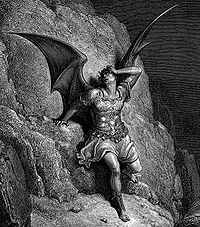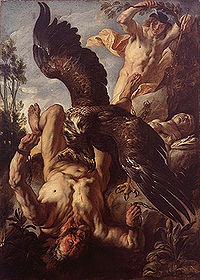
Lucifer and Prometheus
Encyclopedia


Psychoanalytic literary criticism
Psychoanalytic literary criticism refers to literary criticism or literary theory which, in method, concept, or form, is influenced by the tradition of psychoanalysis begun by Sigmund Freud....
written by R.J. Zwi Werblowsky and published in 1952. In it, Werblowsky argues that the Satan
Satan
Satan , "the opposer", is the title of various entities, both human and divine, who challenge the faith of humans in the Hebrew Bible...
of John Milton
John Milton
John Milton was an English poet, polemicist, a scholarly man of letters, and a civil servant for the Commonwealth of England under Oliver Cromwell...
's Paradise Lost
Paradise Lost
Paradise Lost is an epic poem in blank verse by the 17th-century English poet John Milton. It was originally published in 1667 in ten books, with a total of over ten thousand individual lines of verse...
became a disproportionately appealing character because of attributes he shares with the Greek
Greek mythology
Greek mythology is the body of myths and legends belonging to the ancient Greeks, concerning their gods and heroes, the nature of the world, and the origins and significance of their own cult and ritual practices. They were a part of religion in ancient Greece...
Titan
Titan (mythology)
In Greek mythology, the Titans were a race of powerful deities, descendants of Gaia and Uranus, that ruled during the legendary Golden Age....
Prometheus
Prometheus
In Greek mythology, Prometheus is a Titan, the son of Iapetus and Themis, and brother to Atlas, Epimetheus and Menoetius. He was a champion of mankind, known for his wily intelligence, who stole fire from Zeus and gave it to mortals...
. It has been called "most illuminating" for its historical and typological perspective on Milton's Satan as embodying both positive and negative values. The book has also been significant in pointing out the essential ambiguity of Prometheus and his dual Christ-like/Satanic nature as developed in the Christian tradition.
Werblowsky uses the terminology of Carl Jung
Carl Jung
Carl Gustav Jung was a Swiss psychiatrist and the founder of Analytical Psychology. Jung is considered the first modern psychiatrist to view the human psyche as "by nature religious" and make it the focus of exploration. Jung is one of the best known researchers in the field of dream analysis and...
and his school
Analytical psychology
Analytical psychology is the school of psychology originating from the ideas of Swiss psychiatrist Carl Jung. His theoretical orientation has been advanced by his students and other thinkers who followed in his tradition. Though they share similarities, analytical psychology is distinct from...
in examining "mythological projections of the human psyche
Psyche (psychology)
The word psyche has a long history of use in psychology and philosophy, dating back to ancient times, and has been one of the fundamental concepts for understanding human nature from a scientific point of view. The English word soul is sometimes used synonymously, especially in older...
", though he emphasizes that he is not interested in the concept of the archetype
Jungian archetypes
Carl Jung created the archetypes which “are ancient or archaic images that derive from the collective unconscious” Also known as innate universal psychic dispositions that form the substrate from which the basic symbols or representations of unconscious experience emerge...
in the strict Jungian sense. Rather, he sees the myth of figures such as Satan and Prometheus as expressing "the shortcomings … of the world as conceived by the human soul." The relation of power and civilization
Civilization
Civilization is a sometimes controversial term that has been used in several related ways. Primarily, the term has been used to refer to the material and instrumental side of human cultures that are complex in terms of technology, science, and division of labor. Such civilizations are generally...
is explored through the interaction of the concepts of Old Testament
Old Testament
The Old Testament, of which Christians hold different views, is a Christian term for the religious writings of ancient Israel held sacred and inspired by Christians which overlaps with the 24-book canon of the Masoretic Text of Judaism...
sin
Sin
In religion, sin is the violation or deviation of an eternal divine law or standard. The term sin may also refer to the state of having committed such a violation. Christians believe the moral code of conduct is decreed by God In religion, sin (also called peccancy) is the violation or deviation...
and Greek
Ancient Greece
Ancient Greece is a civilization belonging to a period of Greek history that lasted from the Archaic period of the 8th to 6th centuries BC to the end of antiquity. Immediately following this period was the beginning of the Early Middle Ages and the Byzantine era. Included in Ancient Greece is the...
hubris
Hubris
Hubris , also hybris, means extreme haughtiness, pride or arrogance. Hubris often indicates a loss of contact with reality and an overestimation of one's own competence or capabilities, especially when the person exhibiting it is in a position of power....
. In this analysis, Satan "becomes the sole power-exponent in this sublunar
Sublunary sphere
The sublunary sphere is a concept derived from Greek astronomy. It is the region of the cosmos from the Earth to the Moon, consisting of the four classical elements: earth, water, air, and fire. Beginning with the Moon, up to the limits of the universe, everything is made of aether...
, post-lapsarian but pre-eschatological
Eschatology
Eschatology is a part of theology, philosophy, and futurology concerned with what are believed to be the final events in history, or the ultimate destiny of humanity, commonly referred to as the end of the world or the World to Come...
universe, and thus stands as the prototype of human civilizing effort."
Werblowsky sets out to explore "the hero
Hero
A hero , in Greek mythology and folklore, was originally a demigod, their cult being one of the most distinctive features of ancient Greek religion...
ic at its limits", and makes explicit the motivating factor of World War II
World War II
World War II, or the Second World War , was a global conflict lasting from 1939 to 1945, involving most of the world's nations—including all of the great powers—eventually forming two opposing military alliances: the Allies and the Axis...
and its horrors in undertaking this study:
Lucifer and Prometheus was one of 204 volumes in The International Library of Psychology, Philosophy and Scientific Method
The International Library of Psychology, Philosophy and Scientific Method
The International Library of Psychology, Philosophy and Scientific Method was an influential series of monographs published published 1910–1965 under the general editorship of Charles Kay Ogden. This series published some of the landmark works on psychology and philosophy, particularly the thought...
series published 1910–1965 and including titles from Jung, Sigmund Freud
Sigmund Freud
Sigmund Freud , born Sigismund Schlomo Freud , was an Austrian neurologist who founded the discipline of psychoanalysis...
, Jean Piaget
Jean Piaget
Jean Piaget was a French-speaking Swiss developmental psychologist and philosopher known for his epistemological studies with children. His theory of cognitive development and epistemological view are together called "genetic epistemology"....
, Erich Fromm
Erich Fromm
Erich Seligmann Fromm was a Jewish German-American social psychologist, psychoanalyst, sociologist, humanistic philosopher, and democratic socialist. He was associated with what became known as the Frankfurt School of critical theory.-Life:Erich Fromm was born on March 23, 1900, at Frankfurt am...
and others. It was Werblowsky's first published book. This volume was reissued in 1999 by Routledge. It includes an introduction written by Jung.

